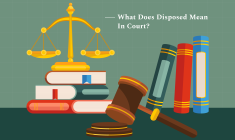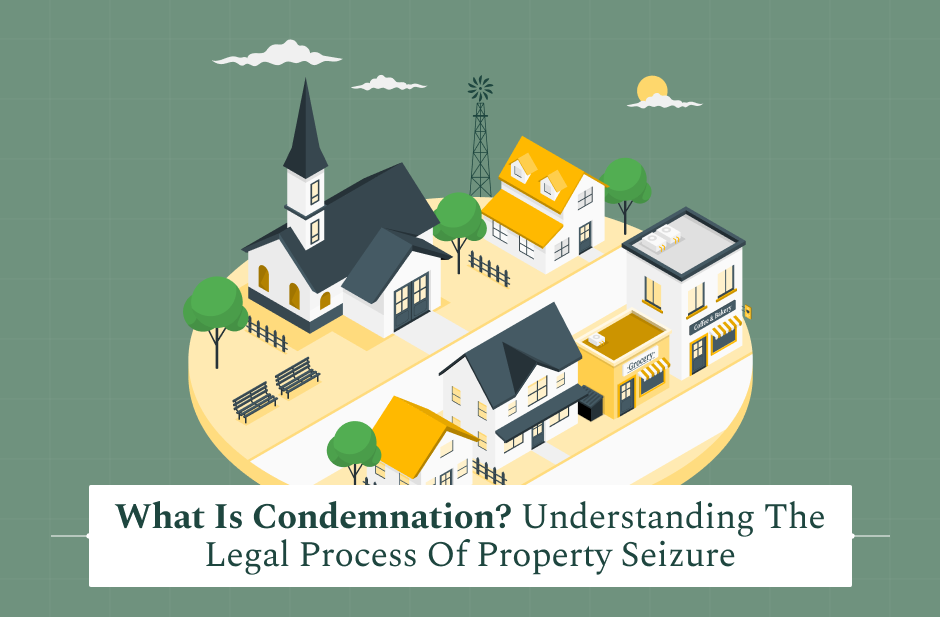Today, we talk about what is Condemnation. It is essential for every property owner in America to know what condemnation entails. Condemnation is the judicial process whereby a government or other accredited agency legally acquires private property for public use.
Understanding your rights can protect your financial interests when the government finds that it needs your land. We break down the complex layers of this fundamental legal authority.
What Is Condemnation?

The doctrine of government taking property hinges on certain fundamental constitutional and legal premises. The process that makes the transfer take place is condemnation. We should define the elementary concepts that determine what is condemnation and its rightful legal system.
Eminent Domain- The Government’s Power
Eminent Domain is the inherent authority of the federal, state, and local governments. It is the authority to take private property for public use. The Fifth Amendment to the U.S. Constitution places two significant limitations upon such power.
- It says that the taking must be for public use.
- The owner shall receive just compensation, according to the Legal Information Institute.
- This power is the foundation of all condemnation cases.
Just Compensation- The Owner’s Assurance
If the government does decide to go ahead with a condemnation proceeding, the property owner is constitutionally entitled to just compensation. This will typically be equivalent to paying for the fair market value of your property on the taking date.
This figure must be determined by what a willing seller would pay a willing buyer. The determination of this figure often leads to disagreement in an action of condemnation.
The only objective of fighting an action of condemnation typically encompasses an increase in the settlement amount.
Inverse Condemnation- Taking Without Formal Action
There are cases where the government does not bring a formal action of condemnation but has nonetheless damaged a property owner. This is known as inverse condemnation.
According to Justia, it occurs when a governmental action, such as oppressive regulatory prohibitions or physical takings through a public project (e.g., permanent flooding, excessive noise), essentially kills the use or economic value of private property.
If the government evades the suit, the land’s rights holder must sue the government in order to get the rightful just compensation. That’s how we answer the question: what is condemnation if the taking is indirect?
What Is Condemnation: The Step-By-Step Process Of Condemnation
The official procedure for deciding what is condemnation is an official legal process. Governments must play by the rules when they desire private property.
Initiation, Notification, And The Necessity Hearing
The government first makes a decision regarding a project need, e.g., building a new park or widening a highway. They pass an ordinance granting the power of eminent domain. Property owners are subsequently officially notified of the government’s plan to acquire the property. Owners are eligible for a necessity hearing in the majority of states.
Owners can, under this hearing, object to the government’s necessity for the specific property. However, Courts will rarely overturn the government’s action. This notice is necessary under condemnation.
Appraisal And Good Faith Offer
The government must then direct a professional appraisal of the fair market value of the property. They must hire competent appraisers for this. The government makes a preliminary written offer to the owner on this appraised value.
Federal law generally requires that it be a “good faith offer.” It is an initial step toward making the legally mandated just compensation. But the property owners are never bound to accept the initial offer. They must make it a bargaining chip.
Negotiation, Mediation, And Litigation
In case you decline the offer, you move into a stage of negotiation. The majority of condemnation disputes resolve themselves outside of court in direct negotiation or formal mediation. In case the negotiations fail, the government initiates a formal lawsuit. That is the act of condemnation itself.
It is here today that a court needs to resolve the issue, if only to find out the quantum of fair compensation. Learning what is condemnation in law means learning this court procedure. This action ensures the constitutional promise of fair payment.
Condemnation And Title Transfer
When settled or on court order, the government deposits into court the sum of compensation determined. The title to the property legally shifts to the condemning agency. This act puts an end to condemnation.
The Monetary Impact Of Condemnation
The assessment of just compensation is the most argued point in the entire process of condemnation. The law attempts to make the owner “whole.”
Defining Fair Market Value
The basis of what condemnation compensation is Fair Market Value. It is the highest amount that a property would sell for in an open, competitive market under all the conditions required for a fair sale.
Courts usually consider three methods: the sales comparison method, the cost method, and the income capitalization method. Contention over these methods adds cost and time to the condemnation lawsuit.
Understand Partial Takings
Sometimes the government needs just part of the property, e.g., a strip for easement for a highway. This is a taking part. The owner in such cases is compensated with the value of the land taken, and also for any damage to the remaining property (severance damages).
These can be huge if the residual property has no use or access anymore. The condemnation definition is used for such complicated partial seizures.
Owner’s Rights And Protection Against Condemnation

If you ever wonder “what does condemnation mean?”, you need to know more about the protections, too. It is daunting to be confronted with a condemnation action, but owners have beneficial rights safeguarding them from unfair acts.
Right To Challenge The Public Use
You do have a right to challenge the legality of the condemnation itself. You can plead before a court that the proposed taking is not really for public use or that the condemning entity is without sufficient legal authority.
Courts do give deference, though, to the government in defining public use.
The Right To Independent Valuation
The owners should acquire their own free appraisal of the property. The counter-appraisal will ensure that the government’s proposed value is fair and just.
Moreover, the most common ground for a lawsuit in a proceeding of condemnation is the dispute over the fair market value. This right is crucial in securing just compensation.
Relocation Assistance
Along with the property, federal and state laws typically provide displaced owners with relocation payments. This financial aid pays for moving expenses, and in certain states, for the cost of finding a comparable replacement dwelling. It is wise to maintain records of such expenses.
Challenges, Controversies, And Recent Legal Developments
The explanation of what is intended by condemnation is typically replete with legal and philosophical debate. What is intended by condemnation has been attempted time and again in the Supreme Court.
Controversies Surrounding Public Use vs. Private Benefit (Kelo Case)
One of the more controversial ones is the characterization of public use. Controversy is likely where the government is condemning land and transferring it over to a private developer, typically for economic development reasons.
The landmark Kelo v. City of New London case (2005) established that economic development is a valid public purpose.
Individuals grumbled that the act is unconstitutional under the Fifth Amendment because it uses the power of condemnation for the benefit of private interests. Thus, most states passed new laws to restrict the eminent domain power for private development.
The South Dakota Pipeline Ruling
Present events still shape the perimeters of condemnation. For example, South Dakota recently prohibited eminent domain application over carbon dioxide pipelines in March 2025, according to Reuters.
The law directly applies to massive infrastructure undertakings. State legislatures deliberately curtail the authority of condemnation where it crosses the rights of landowners.
The events affirm the ongoing conflict between public needs and private real property rights.
Read Also: Contempt Of Court Defined- Legal Terms, Types, And Popular Cases
Best Practices For Owners
In case served with notice of potential condemnation, owners need to act aggressively immediately. Do not delay until the lawsuit is filed.
1. Consult Expert Legal Counsel
Speak with an attorney who focuses on eminent domain law immediately. This is a highly specialized practice; a general attorney can miss crucial deadlines or valuation errors. They understand what is condemnation in court.
2. Write Everything Down
Write down all correspondence, proposals, and deadlines. Pay very close attention to detail, recording the state of your property, current use, and any unique characteristics.
3. Obtain An Independent Appraisal
Have a qualified appraiser with experience in condemnation determine the fair market value of your property. This is your best method for receiving maximum just compensation.
4. Negotiate
Don’t be pushed into taking the first offer. While the government does have the power to take the land, forceful negotiation could increase your settlement and reduce litigation time.
Understanding what is condemnation is the first step in guarding your property rights. The definition of condemnation weighs public necessity against private landowner rights. Be informed, and be prepared.
The law’s power of condemnation is a painful but necessary tool of government. The property owners are therefore entitled to their right to reasonable compensation and objection to unreasonable assessment.
Frequently Asked Questions (FAQs):
Understanding what is condemnation is the first step in guarding your property rights. The definition of condemnation weighs public necessity against private landowner rights. Be informed, and be prepared.
The law’s power of condemnation is a painful but necessary tool of government. Therefore, property owners have the right to reasonable compensation and objection to unreasonable assessments.
Ans. Eminent Domain is the constitutional right or authority vested in the government to take property for a public purpose. Condemnation is the legal procedure by which the government invokes that right.
The definition of condemnation is often used interchangeably with eminent domain. However, condemnation is the procedure under which the owner gets just compensation as required by the Fifth Amendment.
Ans. No, you cannot legally refuse to sell it if the court decides that the taking is required and for a valid public purpose. But you can refuse the initial offer of the government and contest the amount of just compensation.
Inverse condemnation is the reverse. There, the government is sued by the owner of the property to force compensation because a government act has already de facto appropriated the use or value of the property.
Ans. Yes, in the majority of cases. The concept of just compensation has a tendency to go beyond the value of the physical property. Federal and the majority of state legislation on what is condemnation usually includes provisions for relocation benefits.

















